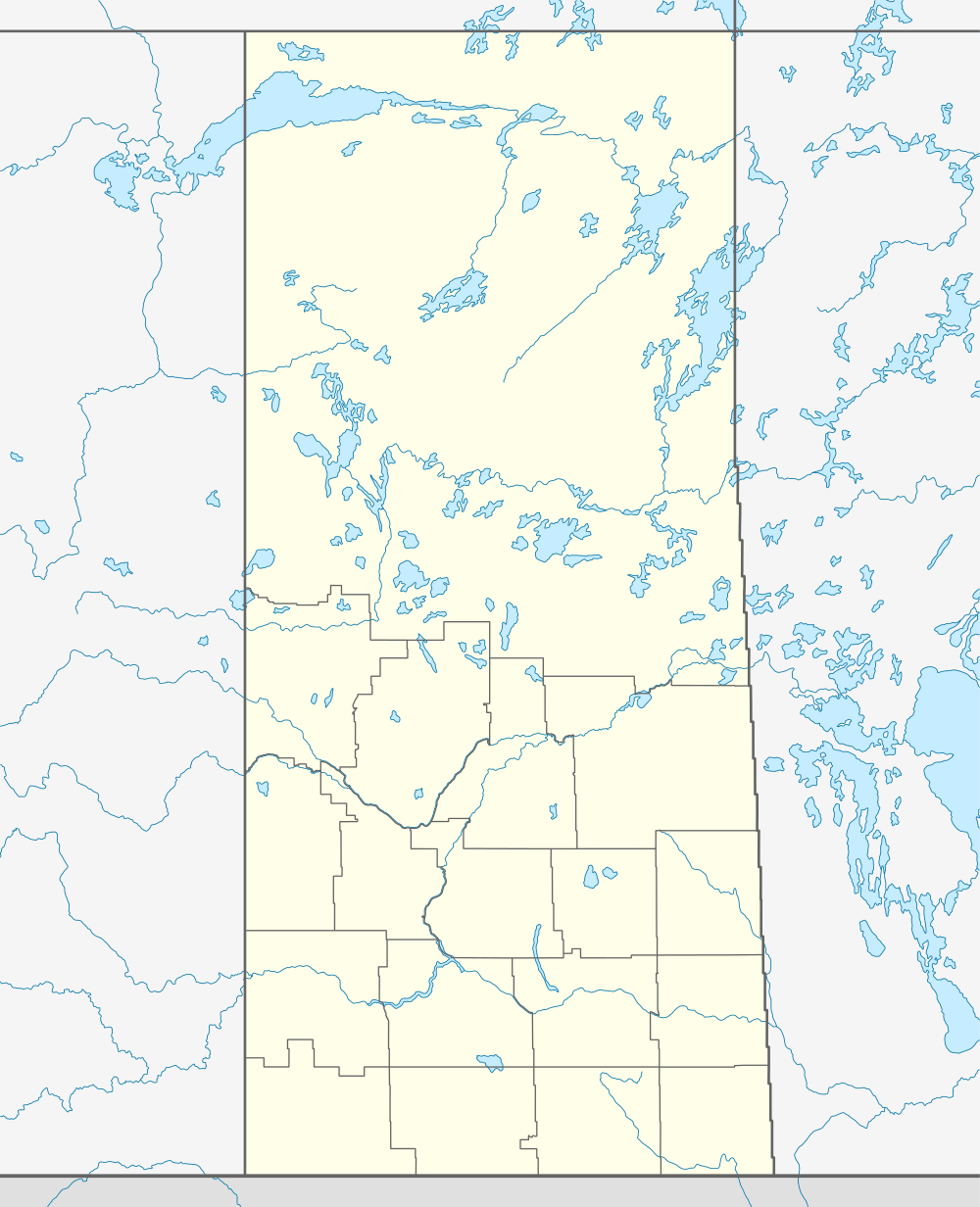Creighton, Saskatchewan
| Creighton | |
|---|---|
| Northern town | |
 Creighton | |
| Coordinates: 54°45′21.96″N 101°53′50.36″W / 54.7561000°N 101.8973222°WCoordinates: 54°45′21.96″N 101°53′50.36″W / 54.7561000°N 101.8973222°W | |
| Country |
|
| Province | Saskatchewan |
| Population (2011) | |
| • Total | 1,498 |
| Time zone | Central (CST) (UTC-6) |
| • Summer (DST) | CDT (UTC-5) |
| Climate | Dfc |
Creighton is a northern town in the Canadian province of Saskatchewan, named after Thomas Creighton. It had a 2011 census population of 1,498 inhabitants, down 0.3% from 1,502 inhabitants in 2006. It is administrative headquarters of the Amiskosakahikan Nation reserve.
This town lies beside the Saskatchewan-Manitoba border, adjacent to Flin Flon, Manitoba. Due to the proximity between these two communities, there is a relatively high level of cross-border service sharing.
One of the most frequently accessed services of Flin Flon is the Flin Flon General Hospital, and Flin Flon Ambulance Service. Due to the small population of Creighton, the Government of Saskatchewan permits its residents in Creighton, Denare Beach, Sandy Bay, and Pelican Narrows to use the basic and emergency medical services of Flin Flon. The nearest Saskatchewan medical centre is in Prince Albert, 400 kilometers southwest of Creighton. In addition, though not legally exempted, Creighton and neighbouring Denare Beach informally observe Daylight saving time in spite of Saskatchewan's prohibition on its official use, thus keeping in sync with the community that is its primary public service resource. Flin Flon's radio and TV outlets are available in Creighton.
Northlands College maintains a campus in Creighton.
The current Mayor is Bruce R. Fidler - elected by acclamation in 2003, and began his second term in 2006.
Their main school, is CCS and students from Creighton and Denare Beach attend school there. It is Pre-K - 12
Demographics
| Historical population | ||
|---|---|---|
| Year | Pop. | ±% |
| 1961 | 1,729 | — |
| 1991 | 1,668 | −3.5% |
| 1996 | 1,713 | +2.7% |
| 2001 | 1,556 | −9.2% |
| 2006 | 1,502 | −3.5% |
| 2011 | 1,498 | −0.3% |
| [1][2][3][4] | ||
| Visible minorities and Aboriginal population | |||
|---|---|---|---|
| Canada 2006 Census | Population | % of Total Population | |
| Visible minority group Source: [5] | South Asian | 10 | 0.7 |
| Chinese | 10 | 0.7 | |
| Black | 0 | 0 | |
| Filipino | 0 | 0 | |
| Latin American | 0 | 0 | |
| Southeast Asian | 0 | 0 | |
| Arab | 0 | 0 | |
| West Asian | 0 | 0 | |
| Korean | 0 | 0 | |
| Japanese | 0 | 0 | |
| Mixed visible minority | 0 | 0 | |
| Other visible minority | 10 | 0.7 | |
| Total visible minority population | 15 | 1 | |
| Aboriginal group Source: [6] | First Nations | 110 | 7.3 |
| Métis | 130 | 8.7 | |
| Inuit | 0 | 0 | |
| Total Aboriginal population | 245 | 16.3 | |
| White | 1,240 | 82.7 | |
| Total population | 1,500 | 100 | |
References
- ↑ "Canada Year Book 1967". 6.statcan.gc.ca. 2009-06-09. Retrieved 2012-07-06.
- ↑ "1996 Census of Canada: Electronic Area Profiles". 2.statcan.ca. 2008-06-10. Retrieved 2012-07-06.
- ↑ "Community Profiles from the 2006 Census, Statistics Canada - Census Subdivision". 2.statcan.ca. 2010-12-06. Retrieved 2012-07-06.
- ↑ "Census Profile - Census Subdivision". 2.statcan.ca. 2012-06-06. Retrieved 2012-07-06.
- ↑ "Community Profiles from the 2006 Census, Statistics Canada - Census Subdivision". 2.statcan.gc.ca. 2010-12-06. Retrieved 2012-07-06.
- ↑ "Aboriginal Peoples - Data table". 2.statcan.ca. 2010-10-06. Retrieved 2012-07-06.